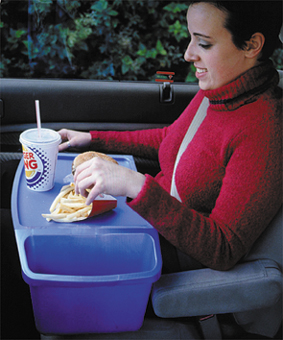- Providing Helpful Healthcare Products Since 1999 | Our Hours: 8 AM - 5 PM CST Mon - Fri
- +1-877-750-0376
Top 4 Assistive Products for Mealtimes
Fully Independent Mealtimes (With a Little Help)
August 22, 2011From the Bed to the Doctor’s Office: Mobility Aids for Caregivers
September 1, 2011
People who have difficulties feeding or drinking independently typically want to do so. As a caregiver, introducing adaptive dinnerware not only can you make your own job a bit easier, but you can give your patient or loved one a degree of freedom and power that they may not have felt for quite awhile.
The question is: What do they want? They may not always be able to voice their concerns, so it here is a list of the top 4 types of products that can make their lives more enjoyable, as well as your job easier:
1. Adapted Plates and Bowls
Eating can be a real problem. Food often refuses to stay on the plate; plates and bowls slide around; and food gets mixed up within the plate. These problems are instantly solved with adaptive dinnerware.
Folks who have difficulties eating love these wonderful aids. Rolling peas, sliding asparagus, and slipping spinach are all kept in check and corralled by special scooper plates. These scoopers have partial lips around the rim to prevent food from sliding off.
But special plates are not always necessary. A wide variety of bumpers, guards, lips are available that slip or clip onto nearly any type of plate to perform the same function as the scooper plates.
2. Non-Skid Plates and Bowls
A good companion to the scoopers and plate guards mentioned above, non-skid plates are another favorite among people who have difficulties feeding themselves independently.
Essentially, there are three ways to keep plates and bowls from moving under the force of a eating utensils: mats, suction bases, and gripper feet. Mats and gripper feet provide a good margin of safety, employing a very “grippy” (but not at all sticky) non-slip material to keep sliding plates and bowls to a minimum. If hand tremors are an issue, then the only true way to actually adhere a plate or bowl to a table is suction-based bowls and plates that will not move at all.
3. Weighted Utensils
Who would ever think that weighted utensils could be so valuable? But, if you have problems with hand tremors, you can easily see the value in such assistive aids. Weighted knives, forks, and spoons are available which help hold trembling hands steady when eating. If you don’t want to buy a special set of utensils, your own utensils can be inserted into weighted holders that have a variety of functions–they can even be used for razors and toothbrushes.
4. Utensil Holders for Better Grip
Utensils can be hard to grip for any period of time. To assist spouses or patients who cannot grip spoons, knives, and forks, there are clips and straps that do the holding for them. But it’s not always necessary to use clips and straps. Sometimes it’s enough just to “fatten up” the handles to make them easier to hold. Foam handles can be inserted on utensils to provide a sure grip, or there are ergonomically-shaped plastic holders that easily slip on and off. All clips, straps, and holders are so portable and easy to manage that they can be taken on the road and used with restaurant utensils.
